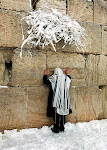1 Elul 5769
Shalom Aleichem Rabosai! It looks like another Elul is upon us. I pray that this will be the Elul where all of Klal Yisrael return fully and wholly to Hashem. And to help facilitate that, this blog will be back for a third season, giving semi-daily (i.e. 3-5 times a week) teshuva-oriented blurbs that will hopefully aid the Teshuva process through the long month of Elul and Aseres Yimei Teshuva.
And away we go...
For me, Elul is the hardest time of the year. Because every year I go through the following thought process (and I would assume that you do too): I know I have sinned, I know I'm probably slated for some kind of punishment, and I know that if I do Teshuva, I can avoid said punishment.
But all of that is very: a) depressing, and b) theoretical. It's depressing in the sense that I feel like I have a debt that's unrepayable, and that's a pretty horrible burden to carry around. It's theoretical in the sense that I cannot possible grasp how many sins I've committed, nor what the punishment will be for those sins. And do I know that I'm definitely going to get punished? How bad is that punishment going to be? Maybe the sins are worth it? Or maybe the punishment is so great that I can't possibly do Teshuva for it? Everything is extremely esoteric.
We'll get to all of the above questions in due time. Al regel achas, don't ever feel that you can never do Teshuva for your sins - the Torah is clear and adamant that we can always do Teshuva, even for a lifetime of sins. But let's work with one part of the above statement for a second: How do you know that if you sin, you're going to get punished?
So in reality, this is not a concept found in Chodesh Elul. Elul teaches us that we can return to Hashem, no matter how terrible our predicament. But how do we know that we need to return to Him? What proves to us that there is a concept of sin, and for that sin there is punishment?
This is what Chodesh Av teaches us. The horrible experiences that us Jews have suffered in Chodesh Av - on both a national and personal level - teaches us about the consequences of sin. We read the Kinnos, Megillas Eichah, the Haftorahs of Chodesh Av, the parshiyos of Chodesh Av - all of these writings illustrate the following simple equation: sin=punishment. Period, end of story. So if we're having a hard time conceptualizing the idea that our sins are going to land us in hot water, just take out that Kinnos or Megillas Eicha that you put away behind the Haggadahs for next year. Or simply read through Moshe's speeches in the first few parshiyos of Sefer Devarim. They're eye-opening reminders.
Now, as I mentioned before, all this is extremely depressing. What, then, is Chodesh Elul all about? Is it about depressing ourselves to the point where we feel that we have to do Teshuva? Does Elul make us focus on our iniquities so much so, so that we feel insignificant and terrible? Chas VeShalom. Elul is something much greater, much more exciting. But that's for another day, and another post. Until then, I wish you much siyata d'shmaya in all your endeavors.
Hatzlacha Raba!
Friday, August 21, 2009
Subscribe to:
Post Comments (Atom)

1 comment:
I dont associate elul with depression I think excitment in the sense that Rosh Hashana is a happy holiday, it isnt till yom kipper that you feel din....
Post a Comment